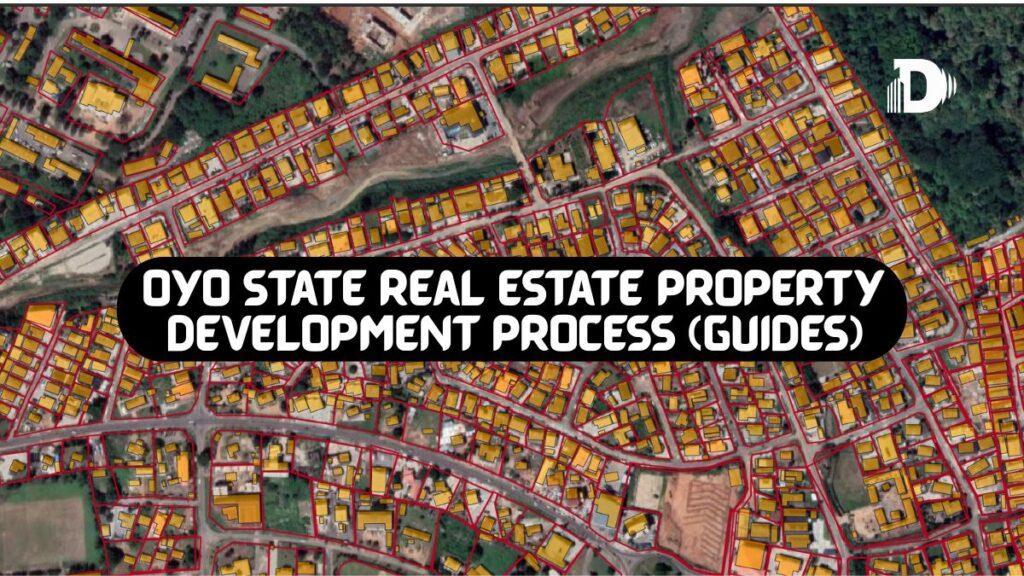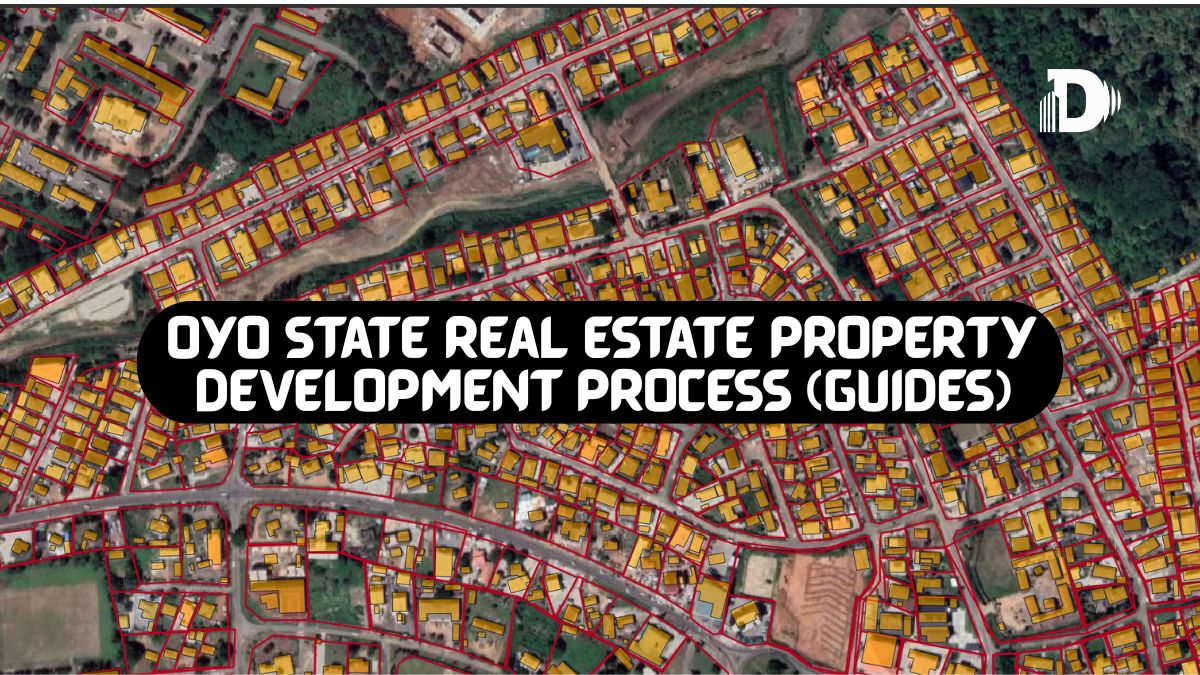Oyo State property development is in phases. And today, we will be sharing everything you need to know about Oyo State property development processes. This step by step guide will take you through every nooks and crannies.
Discover the complete property development process in Oyo State — from land identification and verification to design, construction, approval, and sales. A comprehensive guide by DEVALOP, Nigeria’s trusted real estate developer with strong tentacles in Ibadan real estate landscape.
Introduction: Understanding the Oyo State Real Estate Landscape

Oyo State, home to the historic city of Ibadan and a growing hub of modern urbanization, is becoming a powerful magnet for investors in Nigeria’s real estate market. With rapid infrastructural expansion, improved governance, and an awakening middle class, the state’s property development sector is on an impressive growth trajectory.
However, navigating Oyo’s real estate development process requires deep understanding—of land tenure systems, regulatory frameworks, community relations, and legal compliance. This step-by-step guide by DEVALOP, one of Oyo’s leading real estate developers, unpacks the entire property development process in a clear and actionable way for investors, developers, and aspiring homeowners.
STEP 1: Land Identification and Feasibility Study
Every successful real estate project begins with strategic land identification. In Oyo State, the process involves:
- Location analysis: Assess accessibility, proximity to major roads, markets, schools, and other infrastructural developments.
- Topographical and soil survey: Evaluate the land’s terrain and soil quality for foundation stability.
- Feasibility and ROI projection: Conduct a cost–benefit analysis to estimate profit margins and project viability.
Pro Tip: DEVALOP’s project selection framework prioritizes lands with clear land titles, growth potential, and infrastructure access—like our flagship Cedar Court Ibadan, located in one of Ibadan’s fastest-growing residential corridors. Ibadan real estate development is one the rise due to massive expansion in the state capital. You cannot be wrong to invest in this part of the state.
STEP 2: Title Verification and Land Documentation
Oyo State operates under the Land Use Act of 1978, which vests all land ownership in the Governor. Therefore, due diligence is critical before acquisition. A visit to the Oyo State land title verification office can save you a lot of headache in the future. But if you aren’t cut for such stress, our professionals can help.
Key documents to verify:
- Survey Plan (to confirm coordinates and ensure it’s not under government acquisition)
- Deed of Assignment or Conveyance
- Certificate of Occupancy (C of O) or Governor’s Consent
- Approved Layout Plan
At DEVALOP, we ensure all lands are legally verified through the Oyo State Ministry of Lands, Housing and Urban Development and the Surveyor General’s Office, ensuring zero land disputes post-acquisition.
STEP 3: Land Acquisition and Community Engagement
Once verification checks out, the next phase is formal land acquisition.
This often involves two key stakeholders:
- Customary landowners (often family or community heads)
- Oyo State Government authorities
Developers must engage both responsibly. Community engagement fosters goodwill and prevents the infamous “Omo Onile” drama—land grabbers who disrupt construction when local agreements are ignored.
Best Practices:
- Pay negotiated compensation and signing fees transparently.
- Involve local chiefs or Baales in official documentation.
- Register transactions with Oyo State Lands Registry.
DEVALOP maintains strong community relations, ensuring peaceful and sustainable developments in all its projects across Ibadan and beyond. If you are looking for land for sale in Ibadan and environs, reach out to us.
STEP 4: Physical Planning and Development Approval
Before any construction, a development permit must be obtained from the Oyo State Physical Planning Authority (OYSPPA).
Key requirements for building approval include:
- Architectural drawings (floor plans, elevations)
- Structural and mechanical designs
- Environmental Impact Assessment (EIA)
- Proof of land ownership and title documents
This step ensures your project complies with Oyo’s Urban and Regional Planning laws and building codes.
Skipping this stage can result in project suspension or demolition by the Oyo State Government.
STEP 5: Project Design and Budget Planning
After obtaining your development approval, the project moves into the design and cost planning stage.
This involves collaboration between:
- Architects (for design)
- Quantity surveyors (for cost estimation)
- Civil and structural engineers (for technical design)
- Project managers (for supervision and quality control)
A well-detailed Bill of Quantities (BoQ) helps estimate material, labor, and overhead costs accurately.
DEVALOP’s in-house construction arm—On-Site Devalop Synergy Ltd—handles this phase professionally, reducing cost overruns and ensuring top-tier project execution.
STEP 6: Site Preparation and Construction
The actual transformation begins here.
Once approvals and budget align, the construction phase kicks off:
- Site clearing and grading
- Foundation and structural work
- Framing, roofing, and finishing
- Electrical, plumbing, and mechanical installations
Throughout construction, Oyo State officials may visit for site inspection and compliance checks.
Maintaining transparency during these visits is crucial to avoid regulatory fines or delays.
STEP 7: Infrastructure and Utility Connection
Modern real estate projects go beyond just buildings—they need infrastructure.
Developers should ensure:
- Proper road access and drainage systems
- Electricity connection (via IBEDC or independent solar systems)
- Water supply and waste management plans
Sustainable infrastructure adds value to property resale and tenant satisfaction.
At DEVALOP, we integrate green energy systems and smart infrastructure solutions that future-proof our estates.
STEP 8: Landscaping, Branding, and Finishing
The finishing phase turns a structure into a desirable real estate product.
Landscaping, estate branding, gatehouse construction, and street lighting elevate the visual appeal and perceived value of your property.
Cedar Court Ibadan’s modern landscape design exemplifies DEVALOP’s attention to aesthetics and livability.
STEP 9: Marketing, Sales, and Documentation Transfer
After completion, the project enters the marketing and sales stage.
This involves:
- Listing and advertising (digital, billboard, agent networks)
- Organizing property inspections and virtual tours
- Negotiating offers and closing sales
- Issuing legal transfer documents (Deed of Assignment, Receipts, and Allocation Letters)
DEVALOP employs a 360° marketing system, combining digital marketing, influencer partnerships, and offline visibility to attract buyers from across Nigeria and the diaspora.
STEP 10: Property Handover and After-Sales Support
The final stage is handover and customer support.
Clients receive all original documentation, property keys, and access rights.
For estate projects, DEVALOP also provides:
- Facility management
- Maintenance services
- Security and resident association setup
Our philosophy is not just to sell land, but to create thriving communities that grow in value and happiness.
Conclusion: Building the Future of Oyo State Together

Real estate development in Oyo State is no longer reserved for a select few—it’s an open field for bold investors and visionary developers. By following these ten steps, you can minimize risk, enhance compliance, and ensure long-term profitability.
At DEVALOP, we don’t just build houses; we build the foundation for generational wealth. Whether you’re a first-time investor, a developer, or a diaspora buyer looking to build in Ibadan, our experts are ready to guide you every step of the way.
Talk to DEVALOP Today
- Official Line: 08103435367
- Sales & Enquiries: 08087779782
- Website: www.devalop.com
- Visit Us: Ibadan, Oyo State, Nigeria
Ibadan real estate development


